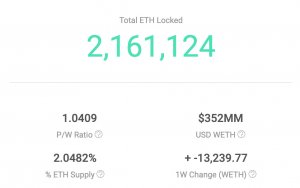 How some traders avoid bitcoin taxes using crypto loans
How some traders avoid bitcoin taxes using crypto loans How some traders avoid bitcoin taxes using crypto loans

Cover art/illustration via CryptoSlate. Image includes combined content which may include AI-generated content.
Some traders are using cryptocurrency as collateral to secure loans, allowing them to keep their bitcoin and get cash while avoiding capital gains tax. Due to the popularity of the option, the crypto loan industry has been growing rapidly.
Crypto Loans and Tax Implications
The ups and downs that have been synonymous with the crypto market ever since its inception don’t seem to affect the lending industry. According to a report from Bloomberg, there has been a steady increase in the number of people using various cryptocurrencies, primarily bitcoin and ether, as collateral to borrow money.
The Apr. 2nd report pointed to Edgar Fernandez, a former Wall Street trader who used some of his Bitcoin as collateral to borrow nearly $100,000. The move allowed him to keep his cryptocurrency without needing to pay capital gains tax on the newly acquired cash, potentially giving the trader more options to trade on margin (by purchasing more cryptocurrency) or pay off higher-interest debt.
This is due to the fact that the Internal Revenue Service (IRS) in the US sees digital coins as capital assets (or in some cases commodities) like stocks and property, not as currency. Cryptocurrency lenders also are not subject to the same level of oversight by the US Securities and Exchange Commission (SEC) or the Commodity Futures Trading Commission (CFTC).

In the US, this is also important when waiting for long-term capital gains to apply to an asset. If a trader holds their bitcoin for a year or more, then they are eligible for the substantially lower long-term capital gains rate instead of getting taxed at the short-term capital gains rate.
The critical factor: using loans (likely) does not reset the waiting period for long-term capital gains, allowing savvy investors to access the cash locked up in their investment.
Typically, lenders require 20 to 60 percent more cryptocurrency as collateral to protect them against crypto’s volatility. Loan amounts range anywhere from $500 to $2 million with durations as long as a year, with interest rates varying from a few percentage points to 16 percent, the report found.
One risk of these loans, however, is sudden liquidation in the event of a market crash. If the underlying cryptocurrency suddenly becomes less valuable, then part of the crypto is liquidated in a margin call to maintain the ratio of collateral to debt.
Cryptocurrency Lending is a ‘Wild West’
While cryptocurrency lending is anything but mainstream, the industry is incredibly profitable. Genesis Capital, an affiliate at Genesis Trading, said it handed out more than $1.1 billion in cash loans against cryptocurrencies in 2018 alone.

The Jersey city-based cryptocurrency lender said its total volume doubled in the last quarter of 2018 compared to its previous two quarters.
However, despite an increased number of transaction, many experts call the digital-currency lending world a “Wild West.” Limited oversight of the industry (and a number of dubious overseas options) has left many concerned about the potential for bad actors in the sector.
Yet, these risks have not stopped demand. Many seemingly “large” crypto lenders have popped out of nowhere, including BlockFi, Compound Finance, SALT Lending, and others.
Many of these lenders have sprawling overseas ‘affiliates,’ and can sometimes be opaque about where or how they store a borrower’s digital currency—important details considering the prevalence of hacking, Bloomberg said.

Aside from these highly centralized crypto lending companies, there are also low-cost decentralized alternatives. One of those lenders, MakerDAO, is a decentralized autonomous organization that uses a series of smart contracts, in conjunction with oracles, to allow Ethereum holders to borrow up to 60 percent of the value of their ETH at an APR of 7.5 percent.
Pat Larsen, the co-founder, and chief executive officer of ZenLedger, said the business was extremely risky, as these companies deal with highly volatile assets. That said, if a bitcoin holder needs to pay off debt but doesn’t want to sell—or wants to wait for long-term capital gains to kick in—then a loan is an option worth considering.
This article is not financial or tax advice. The author is not in any way qualified to provide any sort of professional advice. Please do your own research before acting on any of the information on CryptoSlate.



 Farside Investors
Farside Investors 































































































